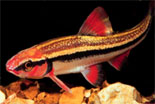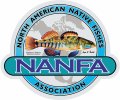| About NANFA |
| Home |
| Mission |
| Publication |
| Grant Programs |
| Administrivia |
| Join NANFA |
| Activities & Programs |
| Annual Convention |
| Regional Outreach |
| Breeder Awards Program |
| E-mail List Archive |
| FishMap.org |
| On-line Discussion Forum |
| Member Photo Gallery |
| For Sale |
| American Currents PDFs |
| Wisconsin's Fishes AC |
| HIDDEN RIVERS Snorkel Guide |
| NANFA Logo T-Shirts |
| Convention T-Shirts |
| Biology & Captive Care |
| Species Checklist |
| Conservation |
| Collecting |
| Fishwatching |
| Captive Care |
| Learning More |
| Fish in Focus |
| Web Links |
| Books & Journals |
NANFA Mission Statement
 |
The North American Native Fishes Association, Inc. (NANFA) is a 501(c)(3) not-for-profit, tax-exempt corporation dedicated to the appreciation, study and conservation of the continent's native fishes. | |
|
Bleeding shiner, Luxilus zonatus
© William Roston |
NANFA Objectives
- to increase and disseminate knowledge about North America's native fishes and their habitats among aquarium hobbyists, biologists, fish and wildlife officials, anglers, educators, students, and others, through publications, electronic media, regional and national meetings, and other means;
- to promote the conservation of native fishes and the protection/ restoration of natural habitats;
- to advance the captive husbandry of North America's native
fishes for the educational, scientific, and conservation benefits it affords:
Education. Captive husbandry of fishes acquaints people with organisms they might otherwise never see alive or know existed, and affords people an opportunity to witness and appreciate their behaviors (feeding, breeding, parental care, etc.). Such acquaintance is a vital step in fostering environmental awareness and promoting a conservation ethic.
Scientific Knowledge. Studying and documenting the captive husbandry of North American fishes can provide information about a species' life history that is otherwise lacking in the scientific record, or difficult to study under natural conditions.
Conservation. The captive propagation of native fishes can play a key role in conservation efforts by several means:- by providing crucial life history information about a species before it becomes endangered;
- by providing aquarium-reared specimens for restocking efforts;
- by serving as a "last-ditch" safeguard against the extinction of a species in the wild; and
- by the legal maintainence of species already extinct in the wild.
- to encourage and defend the legal and environmentally responsible collection of native fishes for private aquaria as a valid use of a natural resource;
- to provide a forum for fellowship and camaraderie among individuals who share a common interest in the diversity, biology, captive husbandry, and conservation of North America's native fishes.
NANFA Member Code of Ethics
NANFA Members who collect native fishes from the wild and maintain them in private aquaria are encouraged to comply with the following Code of Ethics:- It is the responsibility of NANFA members to acquaint themselves with, and abide by, the collecting, fishing and fish transfer regulations of each Country, State or Province in which they collect, transfer, or ship fish.
- Collecting must be done in an environmentally sound and responsible manner, which includes, but is not limited to: a) not removing numbers of fishes beyond that which one requires or is capable of sustaining; b) taking all reasonable actions to prevent negative impacts on the habitat in which one collects; c) respecting private property rights; and d) complying with any law-enforcement, natural-resource, or other conservation officer or agent encountered in the field.
- NANFA members who enjoy collecting and maintaining fishes do so of their own accord. Except for specific programs funded and/or sponsored by the Association, NANFA does not sanction any specific collection and/or captive maintenance of native fishes.
- Not all native fishes are suitable for aquaria, and some species may test the skills of even the most experienced aquarist. Therefore, members are encouraged to research the biology and captive requirements of each species before an attempt is made to remove them from the wild.
- Fishes or other aquatic organisms must not be relocated or introduced into any outdoor bodies of water, even to places where they were originally collected (except catch and immediate release), including specimens raised in private aquaria, without permission from the appropriate governing agency. Members must realize that there are complicated and often unknown ecological processes at work in aquatic systems which may make fish introductions detrimental to the system. Potential problems from such introductions include displacement of native species, spread of disease, and the loss of genetic diversity via hybridization.
- All reasonable attempts should be made to maintain fishes with the utmost regard for their safety and health, which includes, but is not limited to: maintaining sufficient water quality; providing water chemistry, temperature, oxygen levels and foods appropriate for each particular species; species compatibility; and the safe and humane transport of fishes from the wild to the aquarium. Sick or infirm specimens should be euthanized in a humane manner and disposed of properly.
